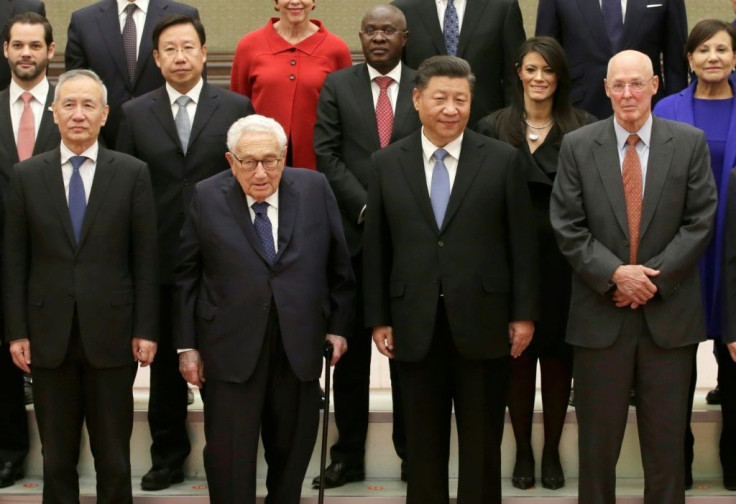Friday's Stock Market Open: US Equities Open Higher On Renewed Hopes For China Trade Deal

U.S. stock indexes are trading mixed, despite some renewed optimism about China-U.S. trade talks and suggestions from Donald Trump that he might not sign the Hong Kong bill that supports protesters, but which has angered Beijing.
The Dow Jones Industrial Average gained 65.28 points to 27,831.57 while the S&P 500 was up 2.35 points to 3,105.89 and the Nasdaq Composite Index fell 6.46 points to 8,499.75.
Donald Trump told “Fox & Friends” on Friday that a trade deal with China is “potentially very close.”
“We have a very good chance to make a deal,” he said.
But Trump suggested he might not sign the pro-democracy Hong Kong bill that passed the House and Senate. “We have to stand with Hong Kong, but I’m also standing with President Xi, he’s a friend of mine,” Trump said. “He’s an incredible guy.”
Trump added: “We are also in the process of making one of the largest trade deals in history. And if we could do that, it would be great.”
The South China Morning Post reported Friday that Xi Jinping wants an interim trade deal with the U.S. but will retaliate if necessary if Washington does not ease tariffs or make other concessions.
“We want to work for a phase one agreement on the basis of mutual respect and equality,” Xi said. “When necessary we will fight back, but we have been working actively to try not to have a trade war. We did not initiate this trade war and this is not something we want.”
Edward Moya, senior market analyst for OANDA, wrote that: “Xi’s comments did not reveal anything new, but served as a reminder that China is also in need of a trade deal.”
Ian Bremmer, president of political consultancy Eurasia Group political consultancy, said the Hong Kong issue is unlikely to thwart a trade deal “as long as it doesn’t further escalate.”
The Wall Street Journal reported on Thursday that Chinese officials invited U.S. trade negotiators to Beijing for a new round of talks.
Former U.S. Trade Representative Charlene Barshefsky said: “My assumption is some tariff relief would be provided, in exchange for a phase one deal. And it seems to me as well that is the only basis on which any deal could actually be done, certainly from the point of view from the Chinese side.”
In her first speech as president of the European Central Bank, Christine Lagarde called for a "new European policy mix" to generate growth in the eurozone economy. She also called for increased public investment in the euro zone to push up domestic demand.
“The answer lies in converting the world’s second largest economy into one that is open to the world but confident in itself – an economy that makes full use of Europe’s potential to unleash higher rates of domestic demand and long-term growth,” she said.
Lagarde said little about monetary policy, except to note that the central bank will “continue to support the economy and respond to future risks in line with our price stability mandate.”
However, data suggests business conditions in Europe are worsening -- IHS Markit’s flash November composite Purchasing Managers’ Index fell to 50.3 from October’s 50.6, just above the 50 mark which separates growth from contraction.
IHS Markit said November’s Index suggests gross domestic product growth of only 0.1% in the third quarter, below the 0.2% figure from last quarter.
U.S. manufacturing sector is showing signs of strength.
IHS Markit said its flash manufacturing purchasing managers index for the U.S. climbed to 52.2 in November from 51.3 in October. The flash services purchasing managers index in November edged up to 51.6 from 50.6.
“A welcome upturn in the headline index from the flash PMI adds to evidence that the worst of the economy’s recent soft patch may be behind us,” said Chris Williamson, chief business economist at IHS Markit.
Overnight, Asian markets finished lower with the Hang Seng dropping 0.48% while Japan's Nikkei 225 fell 0.32% and China's Shanghai Composite was lost 0.63%.
European markets finished higher led by the FTSE 100 which gained 1.22% while Germany's DAX and France's CAC 40 each edged up 0.2%.
Crude oil futures fell 1.26% to $57.84 per barrel and Brent crude slipped 0.84% at $64.02. Gold futures were unchanged.
The euro was down 0.27% to $1.1030 while the pound sterling slipped 0.61% to $1.2831.
© Copyright IBTimes 2024. All rights reserved.





















